It can be unsettling to feel like the ground beneath you is shifting. I remember a time when my family faced unexpected financial hardship. It wasn’t a dramatic headline-making event, but the quiet worry, the tightening of the budget, the feeling of uncertainty – it left a mark. Reading about economic downturns can feel overwhelming, filled with jargon and complex charts. But understanding what's happening, even at a basic level, can empower us to navigate those uncertain times with more clarity and resilience. That’s why I'm so passionate about sharing these books with you. They offer insights into the forces at play during economic downturns, exploring how systems fail, what decisions were made, and what lessons we can learn. This isn't about scaring you; it's about equipping you with knowledge – a compass to help you understand the landscape and find your way forward.
Too Big to Fail: The Inside Story of How Wall Street and Washington Fought to Save the Financial System--and Themselves
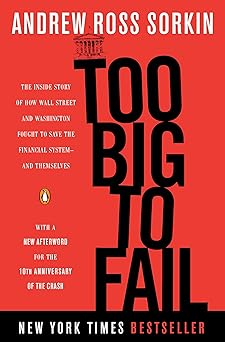
The 2008 economic crisis was a defining moment in modern history, and one that I will never forget. I was working at a young age, learning the ins and outs of the financial world, and seeing the panic that griped every corner of the globe. The story of how Wall Street and Washington worked together to save the financial system is one of the most extraordinary I have ever heard. Andrew Sorkin masterfully weaves together the tale of the players who made the great bets, and how their decisions had far-reaching consequences. From the leaders of the financial institutions to the politicians who were supposed to be in control, Sorkin reveals the personal stories and the behind-the-scenes deals that led to the crisis. It's a story of how the 'system' was in place, so to speak, and how a combination of greed, fear, and ego led to the catastrophic consequences of 2008.
Discover this book on Amazon (affiliate link)
The Return of Depression Economics and the Crisis of 2008
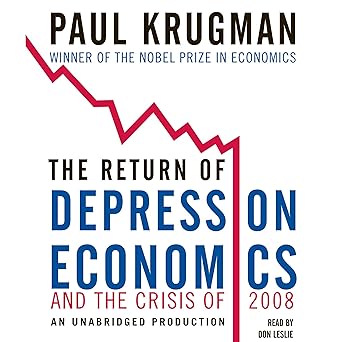
I recently led a discussion in my book club on a thought-provoking book that made me reflect on the past and the present. The book in question explores the idea that the economic crises that swept across Asia and Latin America in the 1990s were not isolated incidents, but rather a warning sign of a more widespread problem. The author, Paul Krugman, highlights how the same economic maladies that caused the Great Depression are making a comeback, and how the failure of regulation to keep pace with an increasingly out-of-control financial system has set the world up for a crisis of epic proportions. I was particularly struck by how Krugman's analysis resonated with my own experiences of watching financial news unfold - the way the housing bubble burst, the vulnerabilities of the financial system, and the dire consequences that followed. The book also laid out a clear roadmap for how to contain the crisis and turn around a world economy on the brink of a deep recession. What struck me most about this book was its accessibility - Krugman's writing is lucid, lively, and supremely informed, making it an easy read even for those who may not have a background in economics. The book's message is timely and urgent, and I believe it is a must-read for anyone who wants to understand the complex issues at play in the world of finance.
Discover this book on Amazon (affiliate link)
A Crash Course on Crises: Macroeconomic Concepts for Run-Ups, Collapses, and Recoveries
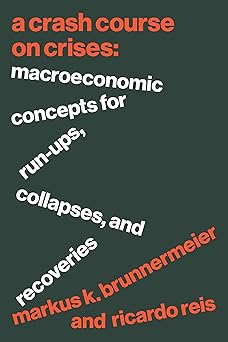
This book offers a comprehensive overview of the macroeconomics of financial crises, a topic that is increasingly relevant in today's economy. The authors, Markus Brunnermeier and Ricardo Reis, draw on the latest research to explain how crises arise, spread, and can be prevented. What struck me about this book was the emphasis on the run-up phase of a crisis, which is often preventable but may go unnoticed. The authors illustrate how key economic forces, such as debt contracts, banks, and the search for safety, can trigger and amplify a crisis. I was particularly struck by the case studies, which range from the 1970s in Chile to the COVID-19 pandemic. These examples highlight the importance of understanding the complexities of macroeconomic forces and the need for policymakers to respond quickly and effectively. The book's clarity and accessibility make it an essential read for students and policy experts alike. The authors' use of novel diagrams and a clear analytical framework helps to break down complex concepts into simple, accessible ideas, making it easier to understand the big picture. Overall, this book provides a valuable framework for understanding the causes and consequences of financial crises, and for developing strategies to prevent and mitigate them.
Discover this book on Amazon (affiliate link)
Freefall: America, Free Markets, and the Sinking of the World Economy
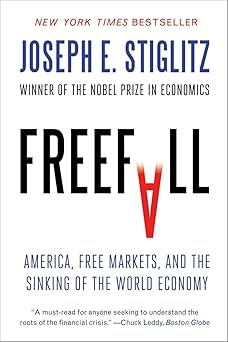
I recently had the privilege of reading a book that left me with a lot to think about, and I wanted to share my insights with fellow book lovers. The book in question is a timely and thought-provoking account of the recent financial crisis, written by a Nobel Prize-winning economist. The author, Joseph E. Stiglitz, has a unique perspective on the crisis, having brought about a much-needed correction to the way we think about economics. According to Stiglitz, the crisis was not just a result of individual failures, but rather a consequence of flawed government policy and unscrupulous personal and corporate behavior. He argues that the current economic system is broken, and that we need to examine the underlying theories that have led us to this point. Stiglitz's writing is clear and accessible, making it easy to understand even for those without a background in economics. He takes a nuanced approach, avoiding easy answers and instead outlining the alternatives and revealing the choices that can make a difference. The book is not just about the financial crisis, but also about the challenges facing America, including health care, energy, the environment, education, and manufacturing. Stiglitz's analysis is penetrating, and he makes a compelling case for a restoration of the balance between government and markets. The book is a must-read for anyone who wants to understand the current state of our economy and how we can move forward to create a prosperous economy and a moral society.
Discover this book on Amazon (affiliate link)
Contention in Times of Crisis: Recession and Political Protest in Thirty European Countries
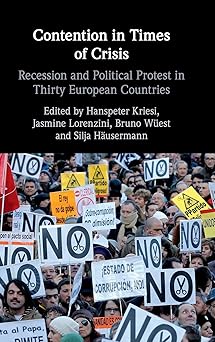
I still remember the sense of uncertainty that filled the air when the economy began to falter. It was as if the very foundation of our societies was being tested, and people were questioning the status quo. The subsequent wave of protests that swept across Europe was a reflection of this widespread discontent. What struck me was the sheer scale and diversity of these protests, with each one highlighting unique grievances and struggles. In this book, the authors delve into the complexities of protest mobilization, reassessing the prevailing theories on the subject. They demonstrate that the protests were not simply a response to economic hardships, but a multifaceted phenomenon that encompassed various political, economic, and social issues. The authors also reveal a fascinating dynamic between electoral politics and protest, showing how the latter has increasingly influenced the former. Through their comprehensive analysis of thirty European countries, the authors offer a nuanced understanding of the intersections between economic and political grievances that drive protest. The book provides a rich tapestry of insights, illuminating the intricacies of protest mobilization in times of crisis and shedding light on the ways in which these events can reshape political landscapes.
Discover this book on Amazon (affiliate link)